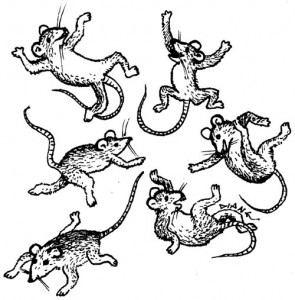
Of Mountains and Mice, Illustration by Diane Wood
In 1989 Jean and I went for a hike on the Singing Pass Trail at Whistler, British Columbia. I knew Whistler Mountain well because I had done some prospecting there in 1965. In those days I used to slide down the glacier on Whistler Mountain on a piece of cardboard because no ski resort existed at that time. In 1965 the village was called Alta Lake, and logging was the main occupation for most residents.
“See how gracefully the light falls on the trees,” Jean said as we walked up the Singing Pass Trail towards Singing Pass itself. “The light sings to us, and I feel like singing.”
“The wind also sings to us,” I said. “This trail has a singing name, and so does the pass up ahead. Melody Creek is below us and Piccolo Summit, Flute Summit and Oboe Summit are above us. The mountain is called “Whistler” after the marmots who whistle to warn of danger. The person who gave these places their English names heard the wind’s music.”
“Yes,” Jean replied, and she hummed to herself until we reached the open space of Singing Pass with its symphony of wild flowers in purple, red, blue, white, orange and yellow, and its fine views of Blackcomb Mountain on one side and Cheakamus Lake and Cheakamus glacier on the other. From Singing Pass we took a steep trail that led to Russet Lake, and I ran out of gas on this trail. “I don’t think I can go any further,” I said as I lay on my back and looked at the pale blue sky. “Russet Lake must be up in the clouds somewhere.”
“We’ll make it,” Jean said. “We’ve come too far to turn back now.”
And we did reach the lake, and the small red cabin for hikers. The cabin was empty, so we picked out a couple of beds and made ourselves to home. Then we walked close to a huge glacier, and gazed apprehensively at fierce mountains with names like “Macbeth” and “Overlord”.
When we returned to the cabin, we found that a group of six people had moved in. They were a friendly, respectful group, and it would have been easy to share the cabin with them. However, Jean and I decided to put up our small, red pup tent. This move would make the cabin more comfortable for the other hikers, and it would bring us closer to the earth and the sky.
“The weather is good. We really don’t need the cabin,” Jean said.
“Let’s go,” I agreed. “We’ll sleep in our pup tent under the stars, and we’ll share with the other hikers the doorless outhouse which overlooks Fitzsimmons Valley and the surrounding mountains.”
“It has the most beautiful view in British Columbia,” Jean said.
“That outhouse is more majestic than the throne of England,” I added.
We set up our tent, cooked supper on our gas stove, watched the stars appear in the clear, night sky, and crawled into bed. In the darkness Jean said, “Something is trying to get into our tent.”
Sure enough, I could hear a rustling on the sides of the tent. “It’s not a bear,” I said quickly.
“The noise is on the roof of the tent,” Jean said. “Something is sliding down the roof.”
“Let’s wait. Our eyes will adjust to the night,” I said.
“There’s more than one of them,” Jean said.
“They’re sliding down the roof of the tent,” I said. “It’s as though they were doing it deliberately.”
“They’re trying to get into the tent, or they’re just having fun,” Jean said. “They slide, and then they climb back up and slide again.”
“I’m having trouble believing this. Are we awake?” I asked.
“We’re awake, and mice are sliding down the roof of our tent as though they were at the P.N.E.,” Jean said.
So we waited in the night as mice played on the roof of our tent. They never got into the tent, and eventually they stopped. In the morning we visited our neighbours in the red cabin. “How did you sleep?” we asked them.
“Terrible,” they replied. “Mice kept us awake all night. They were everywhere, and they were eating everything. We didn’t get any sleep at all.”
I had left my leather camera case hanging on the wall in the cabin. “Here’s your camera case,” one of the hikers said. Half of it had been chewed away.
Jean and I packed up our gear, and prepared to descend to Singing Pass. “Good-bye Russet Lake, and goodbye mountain mice,” we said. “It can’t be an easy world for mice up here. The winters are long and the summers are short. You have given us a story that people will have trouble believing. We thank you for that.”